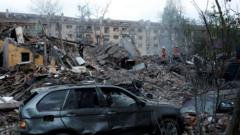As missile and drone strikes in Kyiv result in casualties, President Trump urges Russia to cease its aggression while navigating delicate diplomatic waters regarding U.S. involvement and policy toward Ukraine and Crimea.
Tensions Escalate as Trump Condemns Russian Strikes on Kyiv

Tensions Escalate as Trump Condemns Russian Strikes on Kyiv
In a significant turn of events, President Trump publicly rebukes President Putin following deadly attacks on Ukraine's capital, raising questions about U.S. foreign policy towards Russia.
The recent missile and drone assault on Ukraine's capital, Kyiv, has led to the deaths of at least 12 individuals and left nearly 90 others injured, marking one of the deadliest attacks on the city in almost a year. In response to this aggression, President Trump has taken the unusual step of publicly condemning Russian President Vladimir Putin, imploring him to “STOP!” and calling the strikes "not necessary" and poorly timed.
This criticism comes on the heels of Trump's administration previously pushing for Ukrainian President Volodymyr Zelensky to adopt a U.S. plan perceived to favor Russian interests. During a press conference in the Oval Office, Trump stated that he had "no allegiance" to either nation, emphasizing that his primary objective was to avert further conflict and preserve lives. He did, however, suggest that Putin's offer to halt the takeover of Ukraine was a significant concession aimed at resolving the ongoing war.
Simultaneously, Trump’s potential acknowledgment of Russia's claim over Crimea raises critical questions concerning U.S. foreign policy. Acknowledging this claim would signify a departure from longstanding American principles to not recognize territorial acquisitions gained through force, potentially setting a troubling precedent in international relations.
In Europe, there remains a collective resolve among officials who regard the stability of Ukraine as integral to their own security. European leaders have expressed readiness to uphold support for Kyiv, even if the United States steps back from its diplomatic efforts. As the situation unfolds, the implications of Trump's statements and actions could reshape the dynamics of international alliances and conflict resolution strategies in the region.
This criticism comes on the heels of Trump's administration previously pushing for Ukrainian President Volodymyr Zelensky to adopt a U.S. plan perceived to favor Russian interests. During a press conference in the Oval Office, Trump stated that he had "no allegiance" to either nation, emphasizing that his primary objective was to avert further conflict and preserve lives. He did, however, suggest that Putin's offer to halt the takeover of Ukraine was a significant concession aimed at resolving the ongoing war.
Simultaneously, Trump’s potential acknowledgment of Russia's claim over Crimea raises critical questions concerning U.S. foreign policy. Acknowledging this claim would signify a departure from longstanding American principles to not recognize territorial acquisitions gained through force, potentially setting a troubling precedent in international relations.
In Europe, there remains a collective resolve among officials who regard the stability of Ukraine as integral to their own security. European leaders have expressed readiness to uphold support for Kyiv, even if the United States steps back from its diplomatic efforts. As the situation unfolds, the implications of Trump's statements and actions could reshape the dynamics of international alliances and conflict resolution strategies in the region.






















